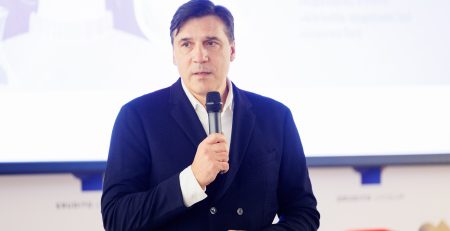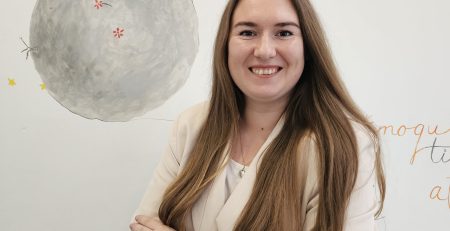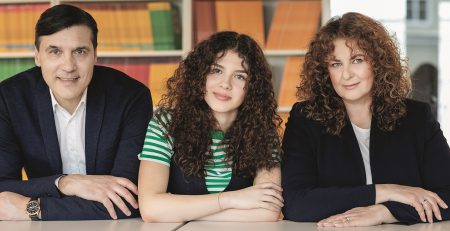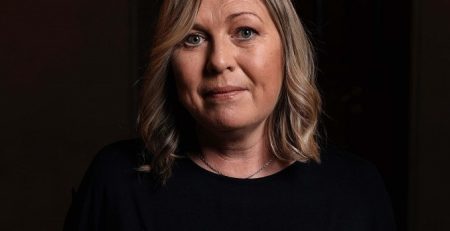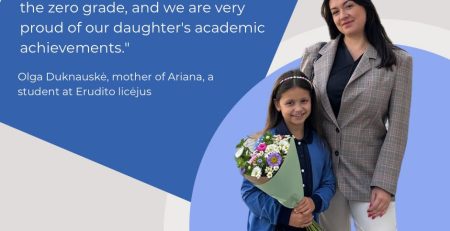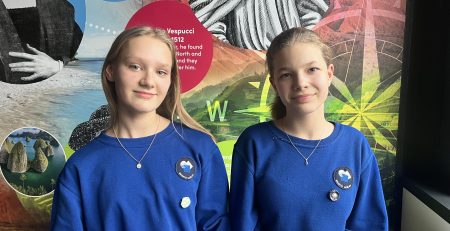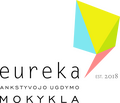
Erudito Licėjus’ Fifth Graders’ Creation, the Children’s Wikipedia, Showcased at a Christmas Digital Projects Fair
Erudito2023-12-11T17:39:05+03:00On Friday, December 8th, at the Lithuanian Exhibition and Congress Centre Litexpo, the Christmas educational student company fair ‘eXpo’ took place. Around a hundred student companies from all over Lithuania presented their projects to the first users and potential investors. The final stage of the program initiated by the Ministry of Economy and Innovation, the Innovation Agency, and the organization Junior Achievement Lithuania took place at the Christmas digital project prototype fair. Students from the fifth and tenth grades of Kaunas Erudito Licėjus participated in the presentation of digital business prototypes for grades 5-8.
“This is an event where entrepreneurial children meet, who already create their first businesses in the school classroom, from fifth to twelfth grade,” said Andželika Rusteikienė, the head of Junior Achievement Lithuania, in an interview on the LRT show ‘Labas rytas, Lietuva’. It is an occasion where, in one place, one can probably encounter the largest gathering of future business leaders.
“For the third year, the Ministry of Economy and Innovation, together with the Innovation Agency, has been bringing integrated, relevant, and creative computer science and business lessons to Lithuanian school classes through entrepreneurship education programs. The Christmas student company fair ‘eXpo’ became, for one day, a hub of ideas worthy of the name ‘entrepreneurs,’ where students from grades 5 to 12 presented their business prototypes,” according to the statement by the Innovation Agency.
Children’s Wikipedia: this is just the beginning
The ambitious and highly intriguing project presented by young programmers from the 5th grade, Barbora, Angela, and Patricija, was the Children’s Wikipedia, which the girls pitched during a session. According to the creators of the idea, the information on the adult version of Wikipedia is presented in too complex a language for children. They aimed to provide kids with their own knowledge and information tool in a language they understand, presenting facts that are most interesting for school-age children.
Barbora, Angela, Patricija, your team is called ‘Young Programmers’, but you are three cool and ambitious girls who have boldly taken on programming challenges. Is it difficult to create a tool like Wikipedia?
Not really.
What was the most challenging aspect of implementing this project?
Perhaps collecting information, processing it, and verifying it.
During the pitch session, you presented three Wikipedia topics: healthy lifestyle, animals, and history. Why specifically these topics?
Because they seem the most interesting to us.
Do you plan on covering other topics in the future?
Yes!
We wish you all the best and hope that all of Erudito Licėjus becomes your collaborators.
Future businesses – already in the school classroom
Participants of the Christmas ‘eXpo’ pilot program gathered 15 teams from different regions of Lithuania and presented their educational companies. During the event, five awards were given for the most startup-like, innovative, creative idea, as well as the best digital product and business model.
The projects were evaluated by representatives from over 150 major Lithuanian companies, and the most innovative and outstanding businesses were recognized with awards for the most startup-like idea and growth potential, the most innovative idea, the most creative idea, the best digital product, and the best digital business model.
“We are extremely pleasantly surprised by your creativity and ability to create prototypes and present your business ideas,” said Monika Katkutė-Gelžinė, the head and founder of the education and learning program “Vedliai,” and Ieva Valeškaite, the Deputy Minister of Economy and Innovation, who awarded the strongest teams.
“Today, you fulfilled my dream that startup prototypes would be created already in school,” rejoiced M. Katkutė-Gelžinė. She herself began creating projects after studying and working in London and felt that it was considerably too late.
The teacher of entrepreneurship and economics, Kristina Abrutienė, reiterated to the commission: “I have always repeated and will continue to do so, that entrepreneurship education should be mandatory in all schools, just like Lithuanian language or mathematics. In today’s market, entrepreneurship education is a necessary condition for education.”
By participating in such and similar projects, students learn not only about entrepreneurship and teamwork but also about public speaking and leadership. “It’s a very useful experience for teams to see how children of the same age can start business ventures,” says K. Abrutienė.
The hardest part is starting
According to Monika Katkutė-Gelžinė, a member of the evaluation committee, the most challenging step is the first one – believing that you can create something.
From decorations to apps helping combat food wastage, from simple candles to digital, engineering, Hightech, and HealthTech solutions – more than a hundred student companies from across Lithuania surprised with such diversity of products and services.
Andželika Rusteikienė, the head of Junior Achievement Lithuania, mentioned that 40% of student companies are technology-oriented. This indicates that this generation is a bold digital technology generation, caring about the future, not only consuming but also creating digital content.
The friendship between Erudito Licėjus and Junior Achievement Lithuania has lasted for several years. Erudito Licėjus is one of thirteen schools in the country selected this year to participate in the digital entrepreneurship education program for students in grades 5-8. Junior Achievement Lithuania, a non-governmental organization nurturing future leaders in Lithuania, is a leader in entrepreneurship and financial literacy education programs, partnering with the education community, businesses, and the government, and is part of the global Junior Achievement network. For thirty years, Junior Achievement Lithuania has implemented progressive economic education, entrepreneurship education, financial literacy, and career education programs in general education schools, vocational training institutions, and higher education.
According to Andželika Rusteikienė, the director of Junior Achievement Lithuania, young people trying to create digital educational companies in school have the opportunity to get to know themselves, strengthen their competencies, and experience what a productive modern work environment means: “It’s a chance to connect with the changing business world where innovation is not only an opportunity but a necessity. We thank the teachers who dared to experiment and open up possibilities for their students. What we witnessed during the event is the innovative and entrepreneurial present of Lithuania.”



